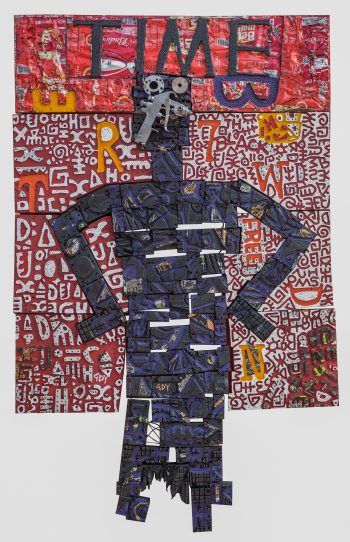Apr 1 - May 8
00:00
The painter Gerald Chukwuma wants us to consider the layers in his work. Everything plays on top of something else creating a timeline where characters and events struggle for prominence and recognition. But recognition from whom? Understanding the turbulence of history, particularly in Nigeria, Chukwuma’s work, while beautiful, reminds us that only shared truths live. Especially when so many facts are buried with their victims.
Event preview:
Through a frenzy of colours and symbols that are chiselled, burnt and painted onto panels of wood, Nigerian artist Gerald Chukwuma creates striking visual language that weaves together ancient symbols, contemporary and historic references. These are the artists ‘scrolls’ that document the untold stories of Igbo culture and modern Nigeria in resistance to one-sided media narratives that are wilfully manipulated by authority figures. Chukuma’s latest exhibition Eclipse of the Scrolls at Kristin Hjellegjerde Gallery’s London Bridge space questions the extent to which we are controlled by the information that we are or aren’t consuming. At a turbulent time in not only Nigerian history but also internationally, the artist’s dynamic sculptural surfaces underline the vital importance of free, creative expression as a form of resistance to everyday indoctrination.

UNTOLD STORIES : TIME UP, 2021 | Mixed media on wood | 137.3 x 81.3 cm / 54 x 32 in
This latest body of work brings together a number of Chukwuma’s concerns in relation to how media shapes our knowledge of not only history, but the present moment. Whilst the manipulation of media by dominating powers is not a new issue, recent national and global crises have provided fresh opportunities to direct public opinion. ‘If you watch the news in Nigeria, you only see footage of people dying of coronavirus in America or the UK, but why are Nigerians not dying? Can we say that we have immunity or the cure?’ says the artist. ‘It’s not about cutting off information, it’s about masking the truth.’ In a sub-series of smaller-scale works entitled Untold Stories, Chukwuma reimagines the covers of tabloid newspapers with symbols and headlines stitched onto the background whilst haunting black figures hang down from the centre, their facial features assembled from mechanical cogs, wheels and padlocks. This collage style is characteristic of the artist’s work, but the hybrid figures – half-man, half-machine – are especially powerful here as a reflection on how the information we are fed or denied impacts our cultural identities and wider sense of self.

FLOWER GIRLS, 2021 | Mixed media on wood | 182.9 x 269.2 cm / 72 x 106 in
For many years, Chukwuma’s practice has been deeply informed and inspired by the Uli art traditions of the Igbo people from southeastern Nigeria. However, through his research, the artist has discovered that Igbo culture has not been sufficiently documented, and as such, knowledge of their heritage is at risk of disappearing from contemporary consciousness. ‘A lack of data is a big problem in Africa,’ he says. ‘I am creating works that I hope can become a form of documentation.’ The Uli patterns and symbols were traditionally painted directly onto the skin or as murals on the walls of a house, which faded in the sunshine or washed away with the rain, but in Chukwuma’s artworks they are made permanent through various artistic processes and embedded within a multitude of references.

ROCK THE BOAT BABY, 2021 | Mixed media on wood | 182.9 x 297.2 cm / 72 x 117 in
Kristin Hjellegjerde Gallery, London Bridge, 2 Melior Place, SE1 3SZ















